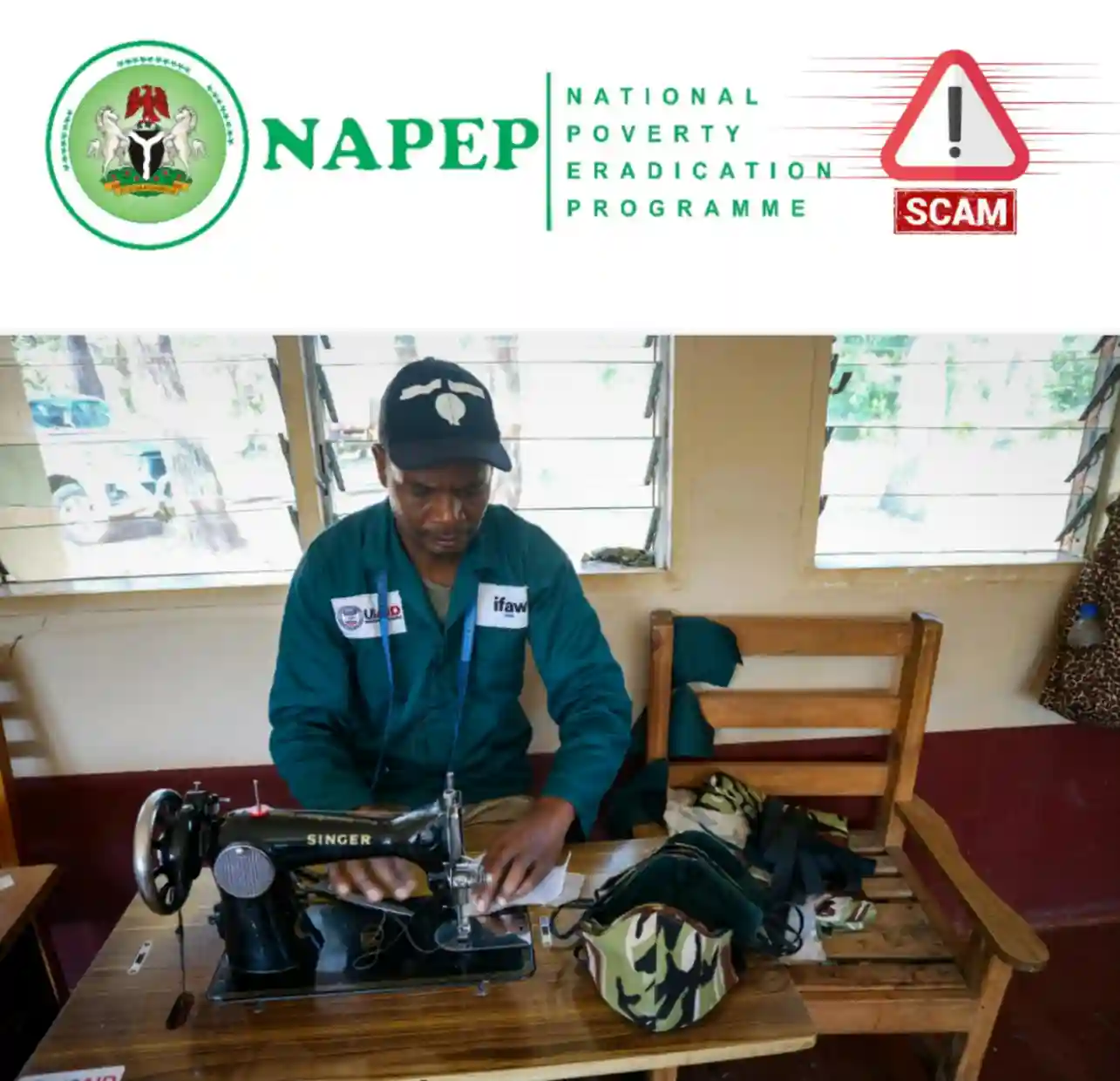The National Poverty Eradication Programme (NAPEP) was a 2001 initiative by the Nigerian government aimed at addressing poverty and unemployment across the country. The programme was created to train youths in vocational trades, support internships, promote micro-credit, create employment in the automobile industry, and assist women suffering from Vesico-Vaginal Fistula (VVF).
According to a 2008 report, NAPEP successfully trained about 130,000 youths and engaged around 216,000 people. However, it was noted that most of the beneficiaries were non-poor individuals, a flaw that weakened the programme’s impact on the actual poor population it was designed to serve.
In late May 2011, the NAPEP website was targeted by Nigerian hacktivists during the inauguration of President Goodluck Jonathan, an event that marked one of the first major cyberattacks on a government-linked platform in Nigeria.
Fast forward to 2025, and a website named napep-gov.ng suddenly appeared online. At first glance, it looked like a government website reviving the dead NAPEP initiative. BUT, it would turn out to be a fraudulent scheme. The scammer(s) behind it used a trick called “domain spoofing” or “look-alike domain fraud,” which is a structural deception where a fake domain mimics a real one. Instead of using a genuine government domain like “.gov.ng,” they used a hyphen “-gov.ng,” misleading Nigerians into believing they were dealing with a legitimate government website.
According to records from the Wayback Machine (web.archive.org/web/20250115000000*/Napep-gov.ng), this fake domain first appeared on January 21, 2025, which also matched its registration date on the Whois record. We could not tell registrant’s details were hidden, making it impossible to trace who owned or created the domain.
By February 11, 2025, this scam website had rebranded itself to appear as if it belonged to the Bank of Industry (BOI). The official BOI website is www.boi.ng, but the scam site cleverly copied its layout and even featured the legitimate “FGN MSME Intervention Program,” which was a genuine federal initiative at that time.

However, while the “Sign Up” button on the fake site redirected users to the actual BOI website, the phone numbers displayed on the fake site were +234 700 225 6264 and +234 700 055 1111. The first number belonged to the scammers. This made victims believe they were contacting BOI directly, but in reality, they were speaking with fraudsters.
When the scammers realized that impersonating BOI was not profitable, they decided to pivot and revive the non-existent NAPEP programme instead. They restructured the fake site into a new version of NAPEP, complete with new contact details including enquiries@napep-gov.ng and two phone numbers: +234 907 728 4732 and +234 703 778 1825.
The redesigned website featured a “Start Registration” button, encouraging unsuspecting applicants to register and provide personal details under the false impression that they were dealing with the Nigerian government.
Throughout these changes, two things the scammers did well were keeping the website’s layout simple and form-focused, and using emotional images about poverty alleviation to attract their target audience, mostly low-income Nigerians looking for government opportunities.
By April 2025, the website’s popularity skyrocketed. Its success was largely because the scammers picked a defunct government initiative with a familiar name, similar to ongoing federal poverty alleviation programmes. This created instant credibility among Nigerians who were already familiar with social intervention programmes like N-Power and Conditional Cash Transfers.
The Zenith
Between June 1st and 5th, 2025, Google Trends data showed a huge spike in searches related to NAPEP. Thousands of people were searching for information about the programme. During this period, Nigeriastartupact.ng also received 100,000s visits linked to the NAPEP story, believing it to be legitimate, especially since two major Nigerian media outlets had already published the NAPEP story in March and April 2025. There is a possibility those publications were sponsored by the scammers to make their scheme appear authentic, something scammers often do to gain public trust.
As a result, this fake NAPEP website began ranking high on Google and other search engines. At the same time, the government’s Conditional Cash Transfer (CCT) initiative was trending across the country.
The Steal
One of the reasons the fake NAPEP scheme spread quickly was because many Nigerians believe in applying for any government programme that promises money or employment opportunities. Many share links and posts without verifying the authenticity, which gave the fake NAPEP massive online attention.
The story spread across major social platforms like Facebook, Nairaland, and X, and even showed up as a trending search on Google (Google Trends). Many Nigerians assumed it was a federal programme and proceeded to fill out the application form and make payments for “NIN verification” as was required on the website.
Most applicants thought it was linked to the Conditional Cash Transfer Programme. This worked because the real CCT programme does not require individuals to apply directly, so Nigerians signed up thinking this was it. How CCT works is that it uses what is called a National Social Safety Nets System (NASSP) whereby identified households are then added to the National Social Register (NSR). This register is the main database used to decide who gets support under programs like the CCT.
At the time, there were ongoing public debates about the government’s claim of disbursing ₦330 billion to 8.1 million vulnerable households. This also contributed to the confusion that made the fake NAPEP scheme appear more credible.
The scammers cleverly took advantage of Nigeria’s Rapid Response Register (RRR) under the Conditional Cash Transfer (CCT) and National Social Safety Nets Project (NASSCO).
A new wave of NAPEP applications began after the Minister of State for Humanitarian Affairs and Poverty Reduction, Tanko Sununu, confirmed that ₦25,000 was being paid to 2.1 million households through the CCT-HoPE-RRR initiative managed by the National Cash Transfer Office (NCTO) in August 2025.
The Requirements and the Scam
The fake NAPEP website listed three major requirements for applicants: National Identification Number (NIN), O-Level result, and an age limit of at least 18 years. The inclusion of O-Level was strange, but the real goal was the NIN verification.
The scammers charged ₦760 per applicant for “NIN verification.” While some cautious citizens backed out at this stage, thousands of others made the payment. The deception worked because many people believed it was normal to pay a small fee for NIN verification.
When you use your NIN for things like SIM registration, BVN linking, job applications, or digital ID checks, some platforms or private agents may charge a small service fee (usually between ₦500 and ₦1,000) to cover token generation through NIMC-licensed agents or the National Identity Management Commission (NIMC) portal. So, the scammer took advantage of this reality to add a NIN verification fee.
Ironically, their FAQ section contained this statement:
“NAPEP does not charge a fee at any stage of the application. You are only required to validate your National Identification Number NIN with NIMC (Charges may apply). NAPEP disassociates itself from any fraudulent activities being perpetrated purportedly in the name of the NAPEP, and/or its officials, and strongly recommend applicants to exercise caution and report any suspected fraudulent activities to local law enforcement authorities for appropriate action.”
The website initially claimed the application deadline was April 30, 2025. But after collecting enough money from applicants, the scammers updated the information to “Application is still Ongoing.”
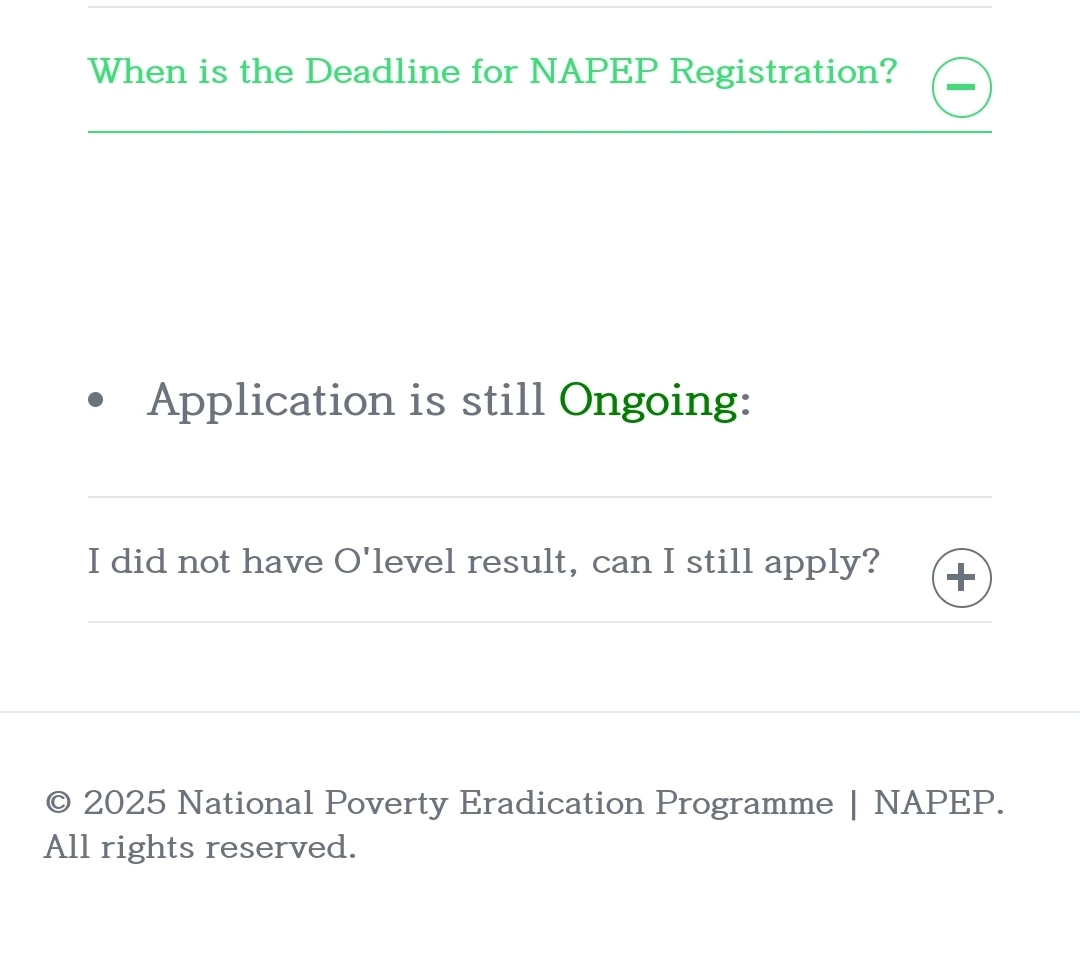
Another section of the FAQ attracted even more victims. It stated:
“All selected beneficiaries will receive a monthly stipend of ₦100,000 paid by National Poverty Eradication Programme (NAPEP) subject to achieving planned results for each month.”
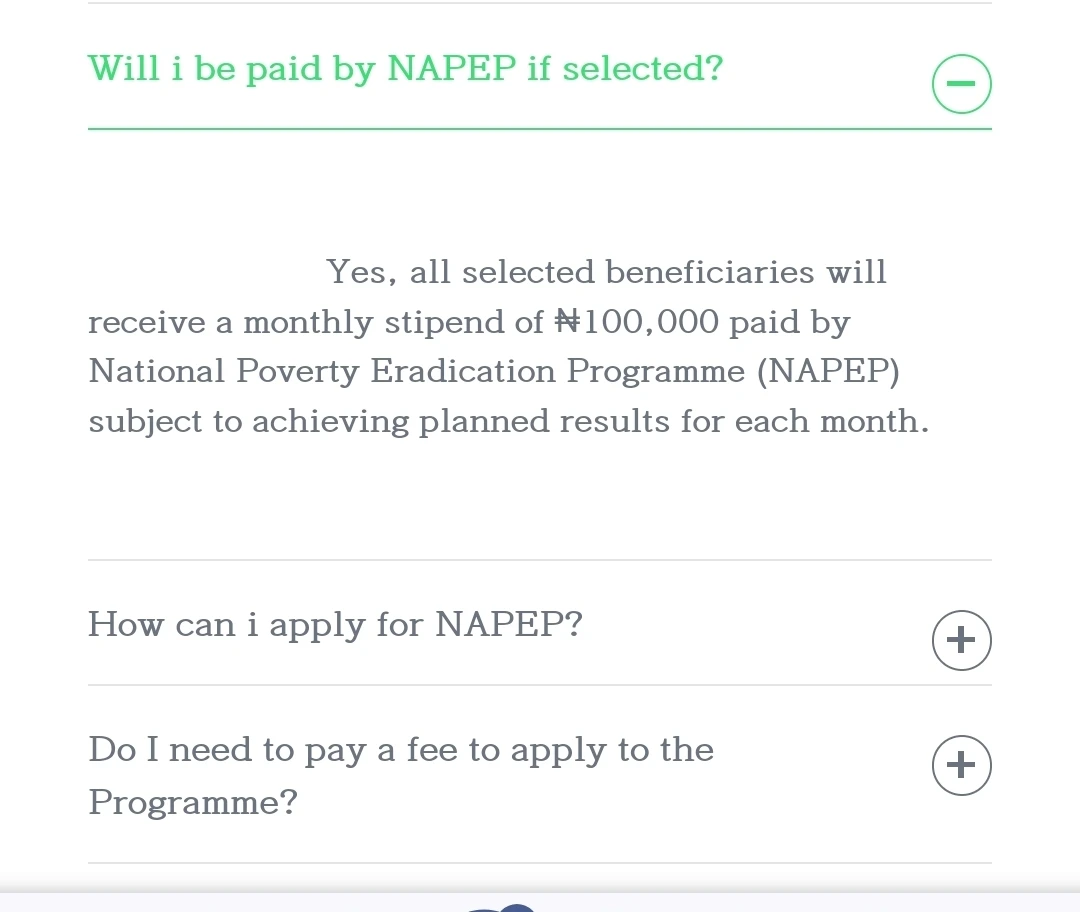
The real Conditional Cash Transfer programme offers ₦75,000 in three installments of ₦25,000 each, making the fake NAPEP’s ₦100,000 promise sound even more appealing. Sadly, many Nigerians refused to believe it was a scam even after warnings.

On one Facebook group dedicated to NAPEP with over 1,000 members, Nigeriastartupact.ng published a warning post explaining the scam. But one user replied, “Nigeria Startup Act I don’t think so my brother.”
The Threats
After Nigeriastartupact.ng exposed the scam, the people behind NAPEP threatened our website to take down the reports.
The Abuse Report
On August 17, 2025, the fake NAPEP operators filed an abuse report to Nigeriastartupact.ng’s web host, HostAfrica.
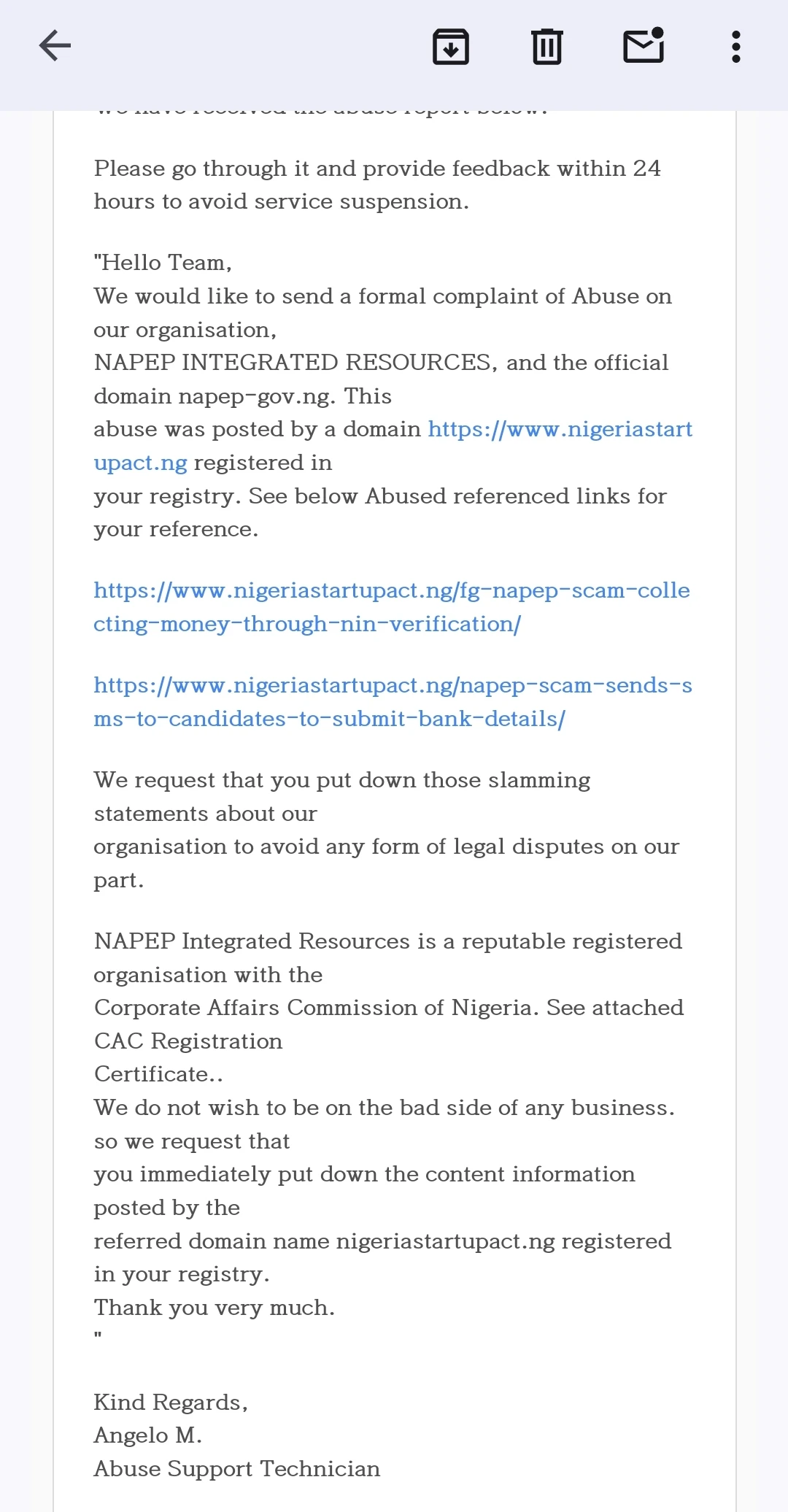
They referenced two specific articles:
https://www.nigeriastartupact.ng/fg-napep-scam-collecting-money-through-nin-verification/ and
https://www.nigeriastartupact.ng/napep-scam-sends-sms-to-candidates-to-submit-bank-details/
In their complaint, they accused Nigeriastartupact.ng of “slandering statements” and warned that legal action could follow if the stories were not removed. They also claimed that “NAPEP Integrated Resources” was a legally registered business with the Corporate Affairs Commission (CAC) of Nigeria.
Attached to their complaint was a CAC registration certificate.
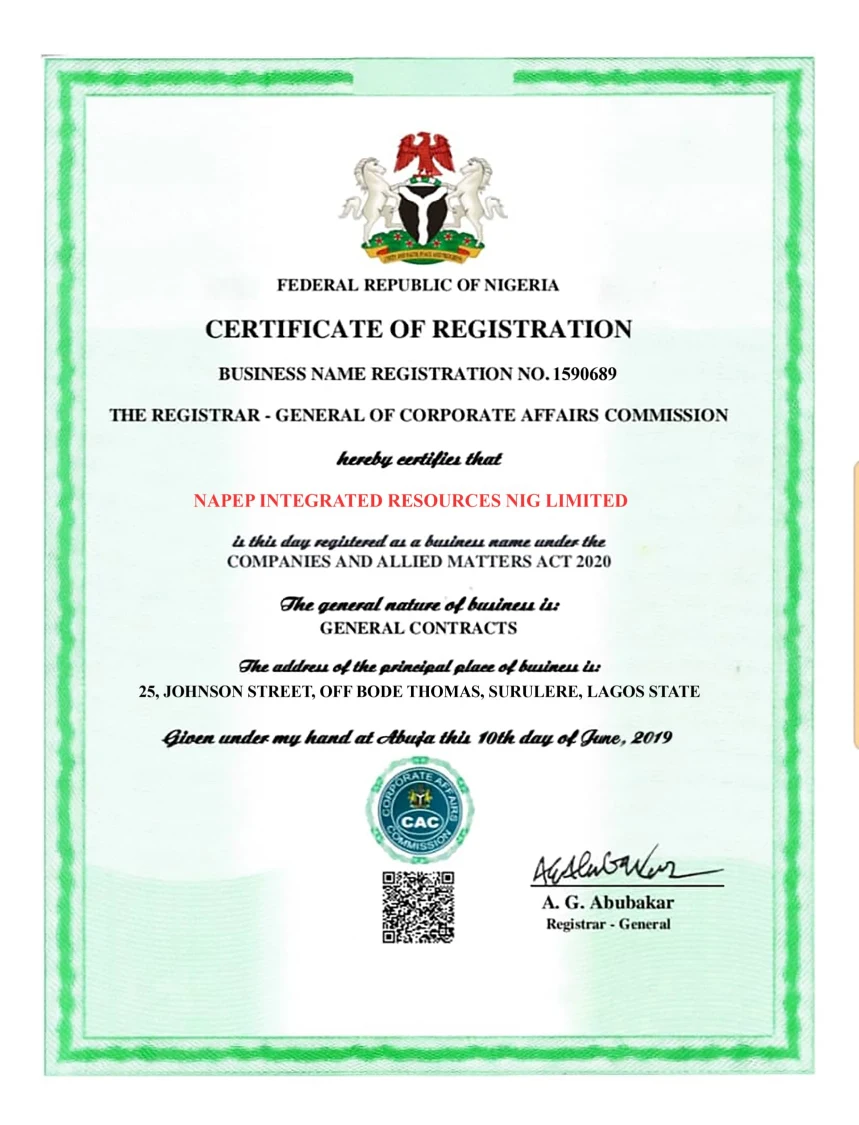
A public business search on CAC’s official website (https://icrp.cac.gov.ng/public-search) showed the following details:
Date of Registration: June 10, 2019
Nature of Business: General Contract and Merchandise
Status: INACTIVE
What happened here is that the scammers found a possibly legitimate but inactive registered company with a similar name and used it to boost their credibility.
Further checks revealed that NAPEP Integrated Resources listed the following individuals:
Garba Mutah – Director and Shareholder
Samuel Sunday Babajide – Director, Shareholder, and Secretary
Abubakar Salisu – Deponent
The CAC email on record was samuelsundaybaba@yahoo.com, and the registered address was 25, Johnson Street, Off Bode Thomas, Surulere, Lagos State.
Given the timeline, this business name existed since 2019—long after the end of the real NAPEP. It is likely the scammers hijacked this old business identity to appear legitimate in 2025.
It questions why the scammers could not reactivate the CAC registration if they were truly behind it. A suggestion they had no control over the registration. Their timing and domain registration patterns strongly suggest ‘opportunism’ rather than ‘legitimacy’.
The message is that Nigerians must remain alert and cautious when dealing with any supposed government initiative online. Those who already made payments to this fake NAPEP site should report to the Economic and Financial Crimes Commission (EFCC), as the scammers may have collected millions of naira under the false promise of government empowerment.
The fraudsters behind this fake NAPEP transitioned from pretending to represent the Bank of Industry to posing as a government poverty eradication agency. They exploited trust, poverty, and digital ignorance to run a large-scale online scam.
To the Nigeria Internet Registration Association (NIRA), do investigate and ensure that similar fake “.gov.ng” domains are not used to exploit citizens. Our recommendation is to scrutinize registrants whose domain names are in formats like ‘site-gov.ng’ or ‘sitegov.ng’, as they could be up to something. HostAfrica, which received the abuse report, also confirmed that it copied NIRA in the correspondence. The hope now is that stronger measures will be put in place to protect Nigerians and prevent such scams in the future.
— Nigeriastartupact.ng Editorial Desk | Paulinus Sunday

